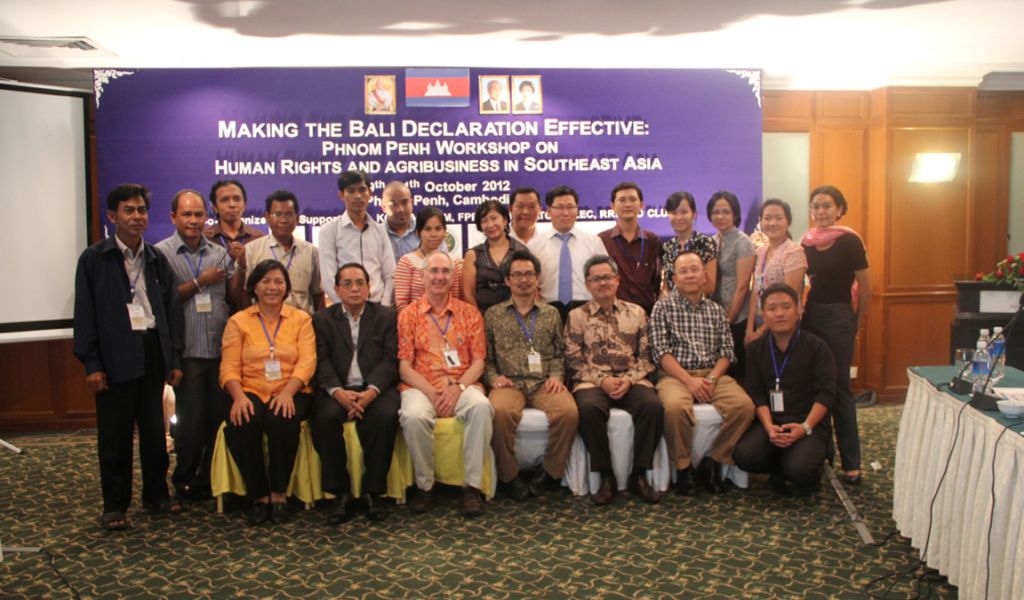Making the Bali Declaration Effective: The Phnom Penh Workshop on Human Rights and Agribusiness

On 9th – 11th October 2012, Forest Peoples Programme and Sawit Watch, with the support of CLEC and funds from the Rights and Resources Initiative, co-organized a workshop, ‘Making the Bali Declaration Effective: The Phnom Penh Workshop on Human Rights and Agribusiness’, as a follow-up event to the Bali Workshop on Human Rights and Agribusiness of November – December 2011. Hosted by the Indonesian National Human Rights Commission (Komnas HAM), the workshop benefited from the participation of National Human Rights Commissioners from Thailand, Malaysia, the Philippines, Myanmar, Singapore and Timor-Leste, the Indonesian representative to the ASEAN Intergovernmental Commission on Human Rights (AICHR), concerned Southeast Asian NGOs (CEDAC, CPN, CHRAC, FNN, CCFC, IDEA, TERRA, ELSAM, CCHR) and of the UN Special Rapporteurs on the Right to Food and on the Rights of Indigenous Peoples.
The purpose of the workshop was to consolidate the outcomes of the Bali Workshop and the Bali Declaration on Human Rights and Agribusiness by encouraging the AICHR to receive or (better) recognize the Bali Declaration and to encourage the AICHR to urge Members States to implement it nationally. The wider goals were to encourage the AICHR to receive complaints and recommendations to inform standard-setting; to encourage the AICHR to sanction an international fact finding process to look into cross border agribusiness cases of human rights violations; and to explore possibilities for the establishment by ASEAN of a regional human rights instrument for Southeast Asia. The published proceedings of the Bali workshop were also distributed on this occasion.
Informative updates on the situation in agribusiness and human rights across the Southeast Asian region were shared by National Human Rights Commissioners, and the workshop participants gained important knowledge about the AICHR and the progress being made to establish an ASEAN human rights mechanism. A field visit to a sugarcane Economic Land Concession in Koh Kong, Southern Cambodia, provided revealing firsthand insights for all participants on the realities of land grabbing, food and water insecurity and forced evictions by transnational corporations, in this case, a Thai and Taiwanese joint venture, for which the Thai Human Rights Commission has found prima facie evidence of violations of human rights including the right to life and the right to self-determination.
The workshop resulted in a joint statement by all participants appealing to the Cambodian Government to resolve the long standing land conflict in Koh Kong Province, and to the European Union, the sugar importers Tate and Lyle and the American Sugar Refining Company to investigate the continuing human rights violations. A follow-up meeting in 2013 is planned to review progress made on the action plan developed jointly by the NHRIs and CSOs on this occasion.

